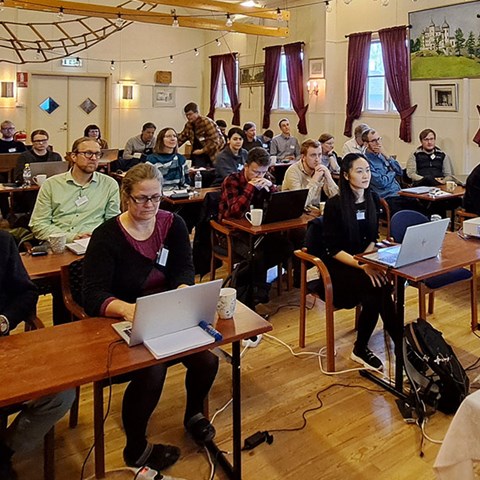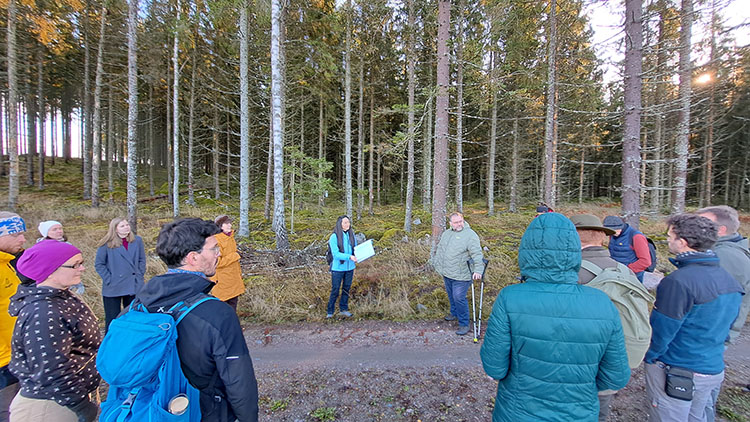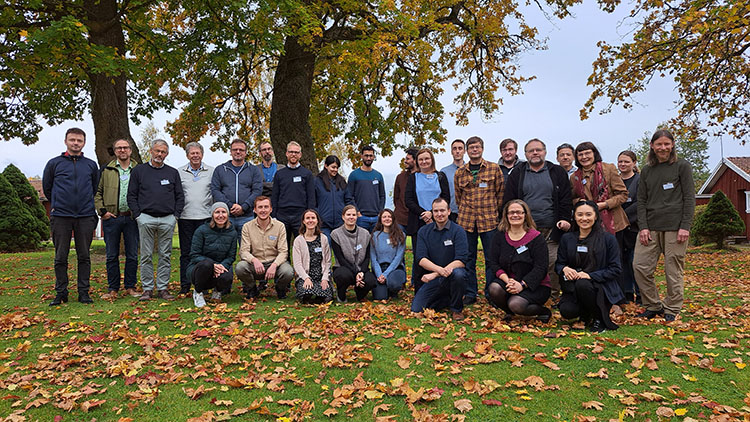Facts:
The third RESDiNET EU project workshop took place in Skara, Sweden, from 7–11 October 2024, organised by SLU in collaboration with the RESDiNET EU project.

Researchers from across Europe gathered, focusing on how remote sensing data can be used to understand forest disturbances and improve forest health monitoring, especially in the context of climate change and spruce bark beetle outbreaks.
From October 8-10, 2024, leading researchers gathered in Skara, Sweden, for the third RESDINET Workshop on forest remote sensing, hosted by SLU's Department of Forest Resource Management. The event showcased the latest advancements in monitoring forest disturbances, focusing on damage caused by spruce bark beetles and climate-driven stressors. Through seminars and hands-on sessions, both online and in-person, participants explored innovative technologies, from satellite to drone applications, aimed at advancing sustainable forest health and resilience.
-Events like these are invaluable for sharing knowledge and fostering collaboration, says Langning Huo, researcher at SLU and main organizer of the workshop. This kind of meetings not only highlight the network but is also crucial for the research progress.
The 1.5 day seminar featured, 16 studies presented by experts from Sweden, Finland, Slovikia, Norway, Italy, covering a comprehensive set of topics, all crucial for forest health monitoring and bark beetle outbreak management. Presentations explored:
Climate Impact on Forest Resistance: How changing climate influences trees' resistance to bark beetles and associated fungi.
Forest Vulnerability: Assessments of Norway spruce susceptibility to drought and beetle attacks, using factors like tree phenology, site conditions, and seasonal changes.
Remote Sensing and Modeling: Techniques using satellite and drone data for monitoring and predicting forest disturbances, including thermal stress and spectral signatures.
Advanced Technology Applications: Cutting-edge tools and deep learning models for early beetle detection and scalable monitoring across European landscapes.
Each topic contributed significantly to understanding and advancing remote sensing techniques for managing forest health under climate pressures.
Next, both online and in-person participants received hands-on training for 1.5 days. The first training was given by Kenji Ose from the European Commission’s Joint Research Center, in methods for processing satellite time series data to enable rapid response to ecological changes in forests. The second training was given by Dr. Reza Belaghi, who introduced participants to the use of generalized linear models in ecological modeling. The session gave attendees practical experience in using R software to analyse environmental factors contributing to forest damage risks.
The third training was given by SLU's Grant Office, aiming at improving participants' skills in proposal writing and grant acquisition. This session provided essential insights into structuring research proposals effectively, highlighting the best practices for showcasing innovative methodologies and aligning with funding agency priorities. Through practical exercises and expert guidance, attendees gained valuable tools for securing competitive research funding, essential for advancing forest health monitoring and resilience initiatives.
The workshop also included a field visit to the Remningstorp test site, a supersite where SLU researchers have been conducting experiments and data collection for remote sensing research. This visit provided insight into how remote sensing data can be combined with field observations for a more comprehensive understanding of forest health.

Additionally, Wiebke Neumann Sivertsson, the Deputy Director of the SLU Forest Damage Center (FDC), presented an overview of the center, detailing its mission, areas of focus, and its role in facilitating interdisciplinary research. FDC’s work serves as a model for other countries and research institutions, demonstrating effective strategies for collaborative efforts in forest health management.
Networking played a crucial role in the workshop, fostering collaboration among researchers, practitioners, and students from various institutions across Europe. By facilitating discussions and knowledge exchange, participants were able to form valuable connections that will enhance future research efforts in forest health monitoring and management. The diverse expertise represented at the event not only enriched the learning experience but also laid the groundwork for future interdisciplinary projects, ultimately contributing to a more robust response to the challenges posed by climate change and forest disturbances.

Recordings of the workshop sessions are available on the RESDiNET YouTube channel.
The third RESDiNET EU project workshop took place in Skara, Sweden, from 7–11 October 2024, organised by SLU in collaboration with the RESDiNET EU project.